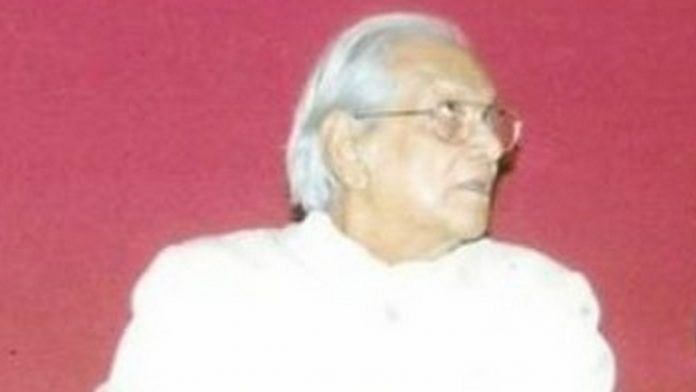New Delhi: “Pehla nasha, pehla khumar
Naya pyaar hai, naya intezaar…”
If these lines take you on a trip down memory lane, and you can’t stop singing it, you have Majrooh Sultanpuri to thank for. One of the finest Urdu poets and Hindi movie lyricists of the 20th century, Sultanpuri has given us some of the most iconic songs from films like Teesri Manzil, Aasha, Yaadon Ki Baarat, Qayamat Se Qayamat Tak, Jo Jeeta Wahi Sikandar, Khamoshi and more. And that’s barely a fraction of his six decades of work.
On his birth centenary Tuesday, ThePrint replays some of his finest songs.
Mushaira in Bombay
Born Asrar-ul-Hasan Khan in Uttar Pradesh on 1 October, 1919, Sultanpuri came from a humble family. Not keen on letting his son have an English education, his father had enrolled Sultanpuri at a madrasa where he became proficient in religious studies, Urdu and Persian. He would later go on to earn Aalim, a degree in Unani medicine. It was then that he changed his name to Majrooh, meaning ‘the wounded one’.
While struggling with a profession that his father chose for him, Sultanpuri attended a mushaira, where he recited a ghazal and became an instant hit. He started focusing more on poetry and even became a student of the famous poet Jigar Moradabadi.
It was at such a mushaira in Mumbai where Sultanpuri’s life changed forever when his poetry impressed filmmaker A.R. Kardar. Kadar soon who got in touch with him through Moradabadi and persuaded the poet to become a lyricist for his film.
But Sultanpuri was dead against it, having a very low opinion of Bollywood. Eventually he did meet composer Naushad, who asked him to write lyrics for a melody. Naushad was highly impressed with Sultanpuri’s lines — “Jab usne gesu bikhraye, baadal aaye jhoom ke”. And thus started his career in films with Shahjehan in 1946.
Also read: Dev Anand’s Prem Pujari spoke about patriotism like no other Bollywood film
The reluctant lyricist
Sultanpuri was always averse to Bollywood, even though he earned his bread and butter from it. When asked about his thoughts on the compositions, he once said, “I never hear my songs. Yeh Hindi film sab nautanki hai (Hindi films are all a farce).”
Nautanki or not, he did give Indian audiences something they could all relate to, irrespective of who they were and where they came from. Songs like Monica! Oh My Darling, O Hasina Zulfon Wali and others just stuck with people — and continue to do so.
He didn’t hold his work with cinema in high regard, despite being honoured with countless awards, including the Dadasaheb Phalke (he was the first lyricist to be given this highest cinematic award). He also worked with the biggest names in music like O. P. Nayyar, S.D. and R.D. Burman, Jatin-Lalit, and Anand-Milind. But when asked how he came up with Eena Meena Deeka, he just shrugged it off as mere ‘jugglery’.
https://www.youtube.com/watch?v=Se1EZCE_zLo
The revolutionary poet
While Sultanpuri made a name for himself in the film industry, he was always a poet at heart. He was avant-garde, turning away from traditional Urdu poetry that would generally focus on life, love, and romanticism. He would, instead, speak about breaking barriers.
“Dekh zindan se parey rang-e-chaman josh-e-bahar
Raqs karna hai to paon ki zanjir na dekh”
(Look beyond the prison walls what flowers have bloomed, at the exuberance and fervour of spring
If you want to dance, don’t look at the shackles of your feet)
He would compose couplets for private projects, books and most importantly for the Progressive Writers’ Movement. A staunch leftist, Sultanpuri, along with many other Urdu poets and writers from India and Pakistan, would gather in public and talk about the British atrocities as well as the then Jawaharlal Nehru government. He was arrested in 1951 for writing and reciting a poem in which he likened Nehru to Hitler.
Aman ka jhandaa is dharti pe
kisne kaha lahrane na paaye
ye bhi koi Hitler ka hai chela,
maar le sathi, jaane na paaye!
Commonwealth ka das hai Nehru
maar le sathi jaane na paae!
(Such unease with our flag of peace! Is it some protégé of Hitler, or a mere slave of the Commonwealth? It’s Nehru, my friends. Take him by the collar lest he gets away)
The leftist movement was his greatest priority. Upon refusing to apologise for his poem, he was jailed in Mumbai for two years along with others like actor Balraj Sahni. Even behind bars, he kept composing for the movement and Bollywood.
However, his passion for politics never really died. When the Communist movement in the country weakened, his disillusionment lent itself to some beautiful poetry:
“Hum ko junoon kya sikhlate ho, hum the pareshan tumse zyada.
Chaak kiye hain ham ne azizon chaar gareban tum se ziyada.”
In his 50-odd-year-long career, Sultanpuri had worked in close to 350 films, and wrote shayari, Qawwali, ghazals, mujra, folk songs and straight-up masala Bollywood songs that are party playlist staples even today. It would be safe to say that nobody else has shown as much versatility as Sultanpuri did. He passed away at the turn of the century on 24 May 2000.
Also read: Ravi Chopra — the man behind the Mahabharat and Baghban



